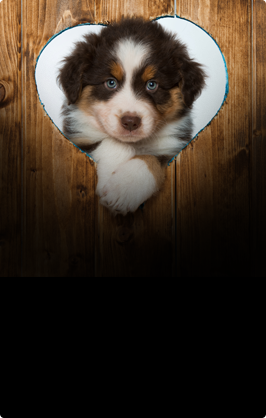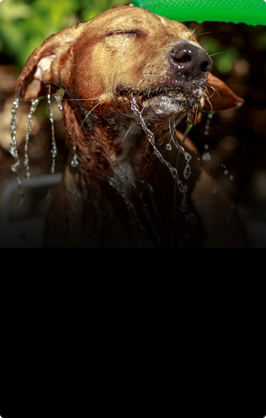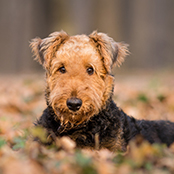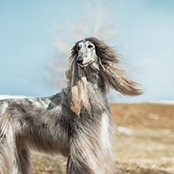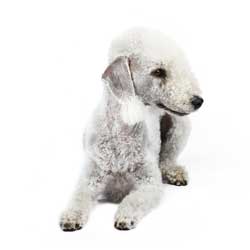Irish Terrier
This tough little terrier makes a wonderfully loyal
companion for an active family. Fiercely protective of
those that they love they make great watchdogs and
loveable friends.
SEE OUR TRAINING SERVICES
Breed Profile
Irish Terrier Facts and Information
Trainability
Being an incredibly intelligent terrier, this breed will require a good strong and patient leader to ensure basic manners and training is achieved. The key with training is to keep it fun and upbeat at all times. If your pup starts to bore, you can be sure they will find something much more interesting to do. Like with all terriers they do love to dig and bark. It’s important that you understand this trait and take precautions to train out any unwanted behaviour. Like with all dogs, early socialisation to as many sights, sounds and experiences as possible is vital in growing a well-rounded and accepting dog. Puppy-preschools work great for this. It’s important to pre-book as these classes do fill up very quickly. Being traditionally bred to case out vermin, on-leash training is important to safeguard your precious pup no matter what might trigger the ‘take chase’ instinct. For this reason, it’s best to only exercise and train your dog in a secured fenced area.
Grooming
This breed is known for being a minimal shedder causing many to seek them out as a hyperallergic dog. However, like with all allergise it’s important to seek professional advice from a medical practitioner before purchasing any breed for allergy reasons. In many cases it’s dander and saliva that causes allergies and not hair. The dense wiry hair of the Irish Terrier will need to be stripped by hand a few times each year to keep the texture and colour of your dog. Some owners opt to have their dogs clipped to reveal a soft and light-coloured coat. The coat will also need to be brushed weekly to keep it in good condition and your wee Terrier looking his best. It’s also a good plan to clip your pup’s nails often during puppyhood so they become used to this regime. If you are unsure how to clip your pet’s nails, ask your veterinarian to demonstrate at your next check up.
Exercise Requirements
Terriers love to run and move so are perfectly suited to active households who enjoy getting out and about. They require two decent 30min brisk walks daily to keep them happy and healthy. The breed will also enjoy a good off-leash run each day, however care must be taken. Only exercise your Irish Terrier in a secure and fenced area to prevent your dog ‘taking chase’ to something fast moving and completely ignoring your recall commands.
Intelligence
The Irish Terrier is a super-smart breed. Pair this with the natural inherited traits of barking and digging and you could have a very problematic pup if you do not ensure your dog is correctly trained, socialised, exercise and loved. Digging and barking are wonderful forms of entertainment for a dog. Teaching manners and what is acceptable and what is not is essential. As too; having a good boredom busting schedule to make sure your dog has a ‘job’ to do when you are not at home or you may find the newspaper, your shoes, or something containing fluff and feathers could become the centre of your pup’s attention.
Family Friendly
When socialised from a young age the Irish Terrier makes a wonderful family companion and a great play mate for any busy household. Like with all child/dog relationships it’s important to teach your child how to correctly interact with a dog, and also train your dog how to correctly play with a child. Supervision is also vital. Your Irish may tolerate smaller pets, but it’s important to fully understand your chosen breeds history. They may learn to tolerate cats if introduced from a young age, however do not be surprised if your wee terrier just can’t resist at times and takes chase.
Indoor/Outdoor
Like with all dog breeds, spending endless hours outside alone will not lead to a happy well-rounded dog. This breed requires good sturdy and high fences to keep them contained during the day. Many owners also dig proof their fences with concrete to prevent escapes. Check fences daily for any holes or possible areas that could see your dog wandering the streets. Also provide ample shelter from all-weather conditions and plenty of fresh water. The breed can adapt to living in an apartment situation however care must be taken in regards to barking and adequate exercise.
Breeding
It is very important to only source your new family member from a reputable breeding establishment, to ensure your puppy is healthy. Ask all the important questions about hereditary problems and ask to see mum and dad. Contact your local breed club and research your chosen breeder. Your breeder should have proof that they regularly test their dogs for genetic diseases and to ensure that the dogs they are breeding from have sound temperaments. It may take a little more time than a quick purchase, but it can save you and your family from unimaginable heartache and pain dealing with a sick puppy.
We love the Irish Terrier and provide the following
 Training
Training
 Grooming
Grooming
 Boarding
Boarding

